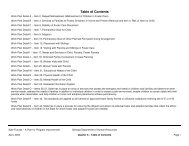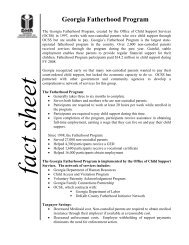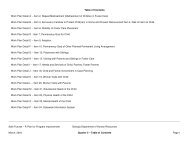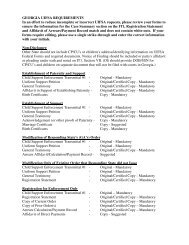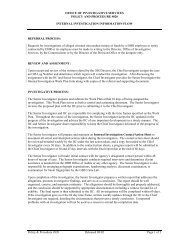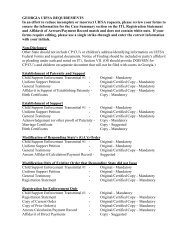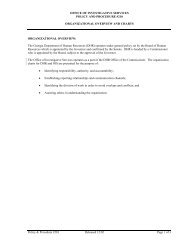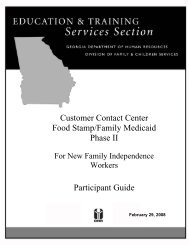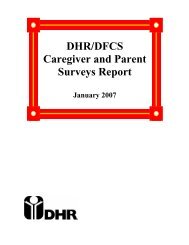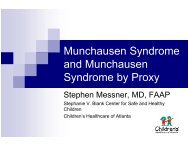an overview georgia program improvement plan - Department of ...
an overview georgia program improvement plan - Department of ...
an overview georgia program improvement plan - Department of ...
Create successful ePaper yourself
Turn your PDF publications into a flip-book with our unique Google optimized e-Paper software.
never used respite care, leaving forty percent (40%) who had used respite care. In Fulton County, fifty seven percent (57%) <strong>of</strong> the sample had used<br />
respite care, leaving forty three percent (43%) who had never used respite care services.<br />
Table 3 displays the reasons that resource families used respite care. The number <strong>of</strong> particip<strong>an</strong>ts who stated the reason is also shown.<br />
Table 3<br />
Tally, by reason, for the use <strong>of</strong> respite care<br />
Reason for respite<br />
Number <strong>of</strong> particip<strong>an</strong>ts who used respite<br />
Resource parent was sick 1<br />
Vacation/out <strong>of</strong> town trip 9<br />
Foster parent conference/seminar 3<br />
Family, personal, or business obligation 5<br />
Break/relief 2<br />
When asked about the benefits <strong>of</strong> respite care services, several particip<strong>an</strong>ts talked about “peace <strong>of</strong> mind” in knowing that their children were being<br />
cared for while they were away. Others were th<strong>an</strong>kful to be able to meet family or business obligations <strong>an</strong>d not have to worry about the children. One<br />
particip<strong>an</strong>t talked about a trip in which respite care was provided for her baby. She stated, “My daughter (older) was able to take a friend. We were<br />
able to participate in activities with the older children that we could not have if the baby had gone.” Another resource parent found someone to trade<br />
<strong>of</strong>f childcare responsibilities with. These two parents now provide respite care for each other.<br />
Several <strong>of</strong> the parents stated there was no negative effect related to respite care services. Four (4) <strong>of</strong> the particip<strong>an</strong>ts found it difficult <strong>an</strong>d stressful to<br />
make arr<strong>an</strong>gements for respite care. They talked about the difficulty <strong>of</strong> locating a provider <strong>an</strong>d not knowing until the last minute whether they would<br />
find a provider.<br />
Nine (9) particip<strong>an</strong>ts or forty-five percent (45%) <strong>of</strong> the sample have never requested that a foster child be removed from their home. Eleven (11) or<br />
fifty-five percent (55%) <strong>of</strong> the resource parents had experienced a placement disruption in their home. Table 4, 5, <strong>an</strong>d 6 show a breakdown <strong>of</strong><br />
particip<strong>an</strong>ts by county <strong>an</strong>d whether the particip<strong>an</strong>t had encountered a placement disruption or not. The tables also indicate whether the particip<strong>an</strong>t has<br />
used respite care services in the past.<br />
Safe Future – A Pl<strong>an</strong> for Program Improvement<br />
Georgia <strong>Department</strong> <strong>of</strong> Hum<strong>an</strong> Resources<br />
November, 2004 Quarter 8 - Work Pl<strong>an</strong> G Page 11




